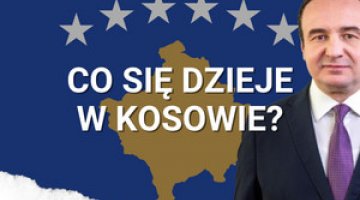Serbia–Kosovo: a controlled increase in tension
Several serious incidents were seen in Serbia-Kosovo relations between 3 and 9 September. At the last moment, the Serbian president, Aleksandar Vučić, pulled out of a meeting with the president of Kosovo, Hashim Thaçi, that was scheduled for 7 September in Brussels. The talks were planned to open up a new round of dialogue concerning the normalisation of Kosovo-Serbia relations conducted under the auspices of the EU. Vučić only met with Federica Mogherini, the High Representative of the European Union for Foreign Affairs and Security Policy. The official reason for this decision was the fact that Pristina had not allowed the Serbian president to see the dam on Gazivoda Lake (it is of strategic significance for the management of water resources and the energy sector in Kosovo) as part of his visit to Kosovo on 8–9 September. The preparations for this visit provoked numerous controversies in both countries. However, finally, Pristina cancelled its objection and Vučić, as planned, visited Kosovo and the Gazivoda dam. However, contrary to previous announcements, he did not reach the Serbian enclave Banja because Kosovar veterans blocked the roads leading there.
Commentary
- The new round of Kosovo-Serbia negotiations is an effect of pressure from the EU and the USA which have been intensely pushing through a normalisation of relations between Belgrade and Pristina as soon as possible and a comprehensive compromise regulating bilateral relations. Over the past few weeks on several occasions, politicians from both countries have suggested that one solution to the conflict could be an adjustment of the Kosovar-Serbian border in exchange for Belgrade’s de facto recognition of Kosovo’s independence. These issues are highly sensitive in Serbia and Kosovo; therefore politicians have been avoiding clear-cut statements. Nevertheless, the Serbian side has mentioned adding four communes of Kosovo inhabited by the Serbian minority to its territory, and Kosovo suggested it might take over three Serbian communes inhabited by the Albanian minority (including the Preševo Valley). Alternative proposals include the exchange of these territories or merely a slight adjustment of the border line. The USA and some EU member states (for example, Austria) as well as some representatives of the European Commission are ready to consider a possible adjustment of the borders. However, Germany is firmly opposed to raising this issue. During her visit to neighbouring Macedonia on 8 September, Chancellor Angela Merkel once again stated that she would not agree to any changes of the borders in the Balkans. This is an effect of Berlin’s fears that an adjustment of the Kosovar-Serbian border to the ethnic division line would add to the pressure on changing the delineation of other borders in the region and cause destabilisation in the Balkans.
- Serbia’s main goal is to protract the talks with Kosovo because its policy towards Pristina is Belgrade’s key bargaining chip in contacts with the EU, and most of the Serbian public opposes the recognition of Kosovo’s independence. However, Germany’s support is valuable to President Vučić. Since Germany advocates the Kosovo-Serbia dialogue, he is ready to feign negotiations with Pristina so as not to risk a conflict with Berlin. Therefore, the Serbs are playing for time, for example, by regularly provoking an escalation of tension in relations with ethnic Albanians living in Kosovo to delay a possible compromise. President Vučić capitalises on such situations to present himself later as a supporter of compromise and he thus wants to put himself at contrast with the stances taken by Kosovo’s ethnic Albanians and the government in Pristina. The absence of a joint strategy of the Western states regarding the future of Serbian-Kosovar relations helps Belgrade protract the talks with Pristina. Vučić is attempting to play on the differences of opinions between the individual states and is capitalising on the increasing tension in relations between Belgrade and Pristina to prove to the German government that the only solution to the dispute is the adjustment of the borders, something Berlin objects to.
- Kosovo’s readiness to reach a compromise is much higher because the lack of recognition from Serbia has prevented Pristina from functioning effectively on the international arena. However, its government has been unable to develop a common strategy on talks with Serbia due to bitter rivalry inside the government coalition. In turn, the opposition, which is actively mobilising the public against the negotiations, is opposed to excessive concessions towards Belgrade. Furthermore, Kosovo’s position on the international arena has weakened over the past few months because its main ally, the USA, is pressing for a quick compromise. The government in Pristina, considering the pressure, has made efforts to prepare the public for serious concessions towards Belgrade and is arguing that there is no alternative to a compromise with Serbs.
Map. The Serbian minority in Kosovo, and the Albanian minority in Serbia




